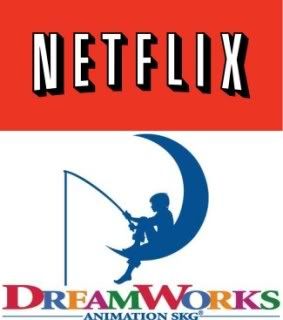LOS ANGELES - DreamWorks Animation, the company behind successful movie franchises like "Madagascar" and "Shrek," said it had completed a deal to pump its films and television specials through Netflix, replacing a less lucrative pact with HBO.
The Netflix accord, which analysts estimate is worth $30 million per picture to DreamWorks over an unspecified period of years, is billed by the companies as the first time a major Hollywood supplier has chosen Web streaming over pay television.
It is also a bet by Jeffrey Katzenberg, the animation studio's chief executive, that consumers in the near future will not distinguish between the two. "We are really starting to see a long-term road map of where the industry is headed," Mr. Katzenberg said in an interview. "This is a game-changing deal." Ted Sarandos, Netflix's chief content officer, added: "You're seeing power moving back into the hands of content creators.
When a company like DreamWorks ends a long-running pay TV deal - when a new buyer in the space steps up - that's a really interesting landscape shift."
The DreamWorks contract comes as Netflix is trying to navigate a dense thicket of challenges.
Competition from the likes of Apple, Amazon and Vudu, a streaming service owned by Wal-Mart, is increasingly fierce; Dish Network, which plucked Blockbuster out of bankruptcy earlier this year, on Friday announced a Blockbuster- branded streaming and DVD-by-mail service.
As a "tidal wave" of Netflix competitors enter, said Michael Nathanson, a media analyst for Nomura, "in the short term it will probably be good for the price of content," because more bidders mean that media companies can charge more for the rights to stream movies like "Avatar" and shows like "Modern Family."
More important, "in the long term it may accelerate changes in consumer behaviors," Mr. Nathanson said, as more people choose to watch more video online.
Access to movies and TV shows is what matters most to Netflix, and Hollywood, after helping to build up the company with generous deals, is starting to play hardball. Next February, Netflix is expected to lose the right to stream films from Walt Disney Studios and Sony Pictures Entertainment, as a result of a failed renegotiation with the premium cable channel Starz. But Netflix's biggest challenge at the moment is self-inflicted.
This summer, in an attempt to raise cash to license more streaming content, the company increased the price for its combination Internet streaming and DVD service, angering customers. On Sept. 18 it abruptly said it would split up the two services, frustrating fans of both.
About one million of its 25 million customers in the United States are believed to have dropped the service in this quarter.
The company has lost half of its value-about $8 billion worth - over the last two months. Mr. Katzenberg said he was confident about the direction Netflix was heading, calling the company's decision to split streaming and DVD "a very tough and very strategic call that will ultimately prove to be the right one for long-term success."
"Could it have been handled better? Absolutely," he added. "But there are always bumps when you're looking around a corner." Netflix will begin streaming DreamWorks films starting in 2013.
The studio plans three releases that year: "The Croods," a prehistoric comedy; "Turbo," about a garden snail; and "Peabody & Sherman," an adaptation of "Rocky and Bullwinkle" characters. Titles from the DreamWorks library, including "Kung Fu Panda" and "Antz," will become available over time, the companies said.
The so-called pay TV window is one of the entertainment industry's most important business tools.
In the past, HBO has paid steep licensing fees of about $20 million per picture for exclusive rights a few months after films arrive on DVD. But Netflix - capitalizing on a consumer shift to streaming content on computers, tablets and Internet-connected televisions - has been making similar deals, albeit mostly with smaller suppliers.
With the DreamWorks deal, Netflix will be able to offer customers exclusive access to a pipeline of films that are reliably some of the year's biggest box office successes. The opportunity to bolster its children's and family offerings was another reason Netflix pursued a DreamWorks deal so aggressively.
Netflix will also gain streaming rights to DreamWorks television specials. "This is one of the few family entertainment brands that matter," Mr. Sarandos said. "It's also a signal to people that we are in no way moving away from movies. Our programming is just reflecting more and more what people want."
For DreamWorks Animation, which has experienced a sharp erosion in its stock price over the last few months, the deal with Netflix comes with one major perk. HBO requires its studio partners to suspend digital sales of movies during its exclusive window, but Netflix will allow DreamWorks to keep selling digital downloads.
What does the loss of DreamWorks mean for HBO? Anything that increases the marketplace clout of Netflix is damaging, but the premium television service will most likely not miss it much. HBO's studio partners are increasingly making animated films and HBO recently brought in Summit Entertainment, the studio behind the "Twilight" films, as a new partner.
HBO notably allowed DreamWorks out of its contract two years early.
Meanwhile, Netflix keeps adding television content. Last week, Netflix announced a renewed content deal with Discovery, the owner of channels like TLC and Animal Planet, that will result in streams of old episodes of "Say Yes to the Dress," "River Monsters" and others.
What is more important, Netflix is soon going to make the source network of shows clearer; people who turn on "River Monsters" will know it is an Animal Planet show.
Signaling support for Netflix, John Weiser, president of domestic distribution for Sony Pictures Television, called it an "important player and a great customer," and said the two companies were "actively discussing producing original programming together."
Netflix is already spending $100 million to create a series called "House of Cards" and acquiring the American rights to overseas properties.
Brooks Barnes reported from Los Angeles, and Brian Stelter from New York.
Source:
ThaNewYorkTimes



















